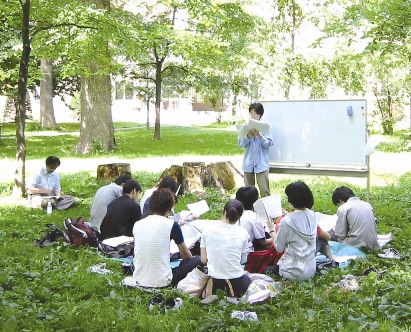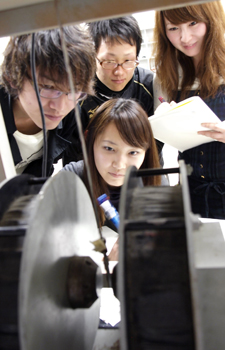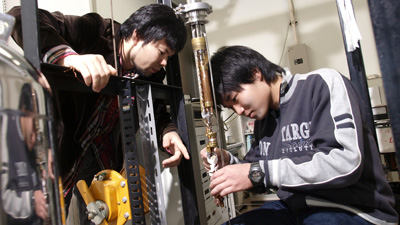The Department of Physics operates under the principle of “cross-fertilisation of creative research and education practices, underpinned by frontier spirits”. Some 40 staff members from diverse backgrounds are involved in quality education and quality research so as to produce graduates well trained to make global contributions. We would like to extend a cordial invitation to you to join us in physics – an enormous and challenging subject area.
The 1st year
Obtaining a solid foundation in the “Faculty of Foundation Studies”
All students spend their first year carrying out their studies in the “Faculty of Foundation Studies” and then move on to their respective faculties or departments at the beginning of the 2nd year. The Department of Physics organises introductory tours for 1st year students so that they can develop a fairly good idea as to what they will be doing with us in their 2nd year and thereafter. In the physics module, you will be attending well-structured lectures in mechanics, wave motion, thermodynamics, and electromagnetism, thereby obtaining basic knowledge and the scientific approaches required for further specialised studies. In the module of natural science experiments, you will be required to conduct experiments where your curiosity about and receptivity to natural phenomena will be enhanced. In this module you are also expected to familiarise yourself with the scientific approaches that are employed in contemporary science and technology.
The 2nd year
Expanding your scope and improving your English
Your scope of studies in physics expands exponentially in the 2nd year, with the commencement of lectures and practicals in mechanics, physical mathematics, thermodynamics, electromagnetism, quantum mechanics, statistical mechanics, etc., as specialised core subjects. In the classes on literature reading, you will be reading academic physics journals written in English, from which you will be expected to develop language skills, presentation skills, and global perspectives – all of these being important qualities for conducting research.
Social events are organised throughout the year, for example, a welcome reception for the newly arrived 2nd year students, short trips, and laboratory-by-laboratory presentations. Interactions with the department are activated by these events, and you will find opportunities to talk with staff members and students at more advanced levels about laboratory life, career development, etc.

The 3rd year
Deepening your understanding and enhancing experimental skills
Specialised core subjects, such as electromagnetism, quantum mechanics, and statistical mechanics, are continuously taught through lectures and practicals.
In the physics experiments class, you are expected to obtain basic experimental skills and develop problem-solving skills. You will be carrying out experiments dealing with major topics in physics and be exposed to natural phenomena first-hand, the expectation of which is that you deepen your understanding of physics. You will also obtain an understanding of the logic behind the experiments, practical techniques with circuits, computers, etc., and laboratory techniques necessary for physics experiments.

The 4th year
Laboratory assignment and final-year project
You will decide which topic you would like to work on for your final-year project based on consideration of your studies in 2nd and 3rd years, and be assigned to a laboratory accordingly. With your own project, you are expected to develop skills in research-planning and implementation.



